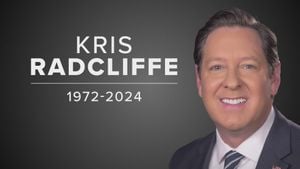Pressure is mounting on the fossil fuel industry as activists continue to push for accountability for climate change-related damages. Recent incidents, including devastating floods and extreme weather events, have solidified the urgency of the situation.
Jennifer Sebold, from Montpelier, Vermont, is one of many citizens whose lives have been upended by climate-related disasters. The mother of three lost two businesses during the Great Vermont Flood of 2023, underscoring the personal toll of climate change.
But Sebold's plight is not unique. The state of Vermont has taken unprecedented steps by becoming the first state to demand damages from major oil companies, holding them accountable for their role in global warming.
Scientists attribute climate change mainly to the burning of fossil fuels, which releases greenhouse gases and leads to extreme weather patterns. This established scientific consensus has galvanized action across the U.S., particularly post the catastrophic flooding events.
While many still persistently deny climate change, Sebold argues, "These aren't natural disasters. They're crimes." Her statement reflects the frustrations of countless climate change survivors seeking justice for their losses.
A coalition led by the non-profit group Public Citizen has banded together with other victims, urging Attorney General Merrick Garland to launch formal investigations against fossil fuel companies. They assert these companies have long been aware of the risks associated with fossil fuel consumption yet chose to prioritize profits over public safety.
The allegations indicate not only negligence but also potential criminal activity, as the letter outlines the disinformation campaigns these corporations have employed to mislead the public. The burning of fossil fuels has directly contributed to extreme weather events, which have caused significant damage to lives and properties across the country.
According to Public Citizen's senior policy counsels Aaron Regunberg and Clara Vondrich, the lack of action from the Justice Department mirrors hesitations once experienced during the confrontations of Big Tobacco. "There's disappointment" at the current pace of accountability, Regunberg expressed.
Despite the overwhelming evidence, some officials remain hesitant to act. Activists worry about future leadership directions, particularly if former President Donald Trump is re-elected, as he has publicly dismissed climate change research.
“Trump's comments about beachfront properties show lacking empathy for those affected by climate disasters,” Regunberg stated, shedding light on the disconnect between political rhetoric and the reality faced by climate victims.
While there is cautious optimism among activists who believe the Justice Department may eventually take action, many grassroots campaigns continue to gain traction. The Vermont Super Fund law, for example, aims to allocate profits from Big Oil toward climate mitigation efforts.
Comparatively, the notion of prosecuting fossil fuel companies for climate homicide might seem radical. Advocates suggest viewing climate-related deaths not as tragic accidents but as potential crimes against humanity.
Public Citizen's recent report argues the time has come for serious legal scrutiny of fossil fuel giants, pointing to evidence linking their operations to climate-induced fatalities. For example, the extreme heat conditions during the summer of 2023, which led to significant loss of life, were determined to be largely driven by human-induced climate change.
Legal experts state there is plenty of evidence to justify pursuing charges against the oil giants for reckless manslaughter. Donald Braman, who helped author the report, remarked, "Fossil fuel companies know what is happening. And yet they have deceived and disinformed the public and regulators for decades."
Studies have confirmed the connection between fossil fuel emissions and rising temperatures, advancing the argument for accountability. Indeed, some companies even acknowledged the severe risks associated with their operations back in the 1980s, professing their awareness of the potential for catastrophic outcomes.
Names like ExxonMobil and Chevron have repeatedly appeared as culprits exemplifying corporate irresponsibility. Data from Public Citizen indicates these companies have emitted substantial fossil fuel pollution since the late 1960s, exacerbated by their lobbying efforts aimed at delaying climate regulations.
Building on the idea of climate homicide, various state laws already exist to penalize corporations for endangering public safety. Pennsylvania, for example, possesses laws concerning causing or risking catastrophe, adding legal frameworks to challenge the fossil fuel industry.
Nevertheless, the reality of prosecuting such large corporations presents substantial challenges. The standard of proof required to secure convictions under criminal law is exceptionally stringent, leading to questions of feasibility.
Legal experts have acknowledged the difficulty of linking specific climate-related deaths to the actions of fossil fuel companies. Prosecutors must demonstrate a direct causal connection between adverse weather events, climate change, and the companies' activities to prove liability.
Nevertheless, advocates remain steadfast, arguing there are clear links between the companies' actions and climate impacts. They point out the disinformation campaigns executed by these firms have hindered effective climate action, delaying necessary transitions toward renewables.
Climate attribution science, which delves deep within these issues, plays a pivotal role. Recent studies have shown increasing proof correlates extreme heatwaves directly to human-induced climate change, establishing empirical links necessary for legal arguments.
Some expert opinions advise caution, noting this area of science is still relatively new and hasn’t been tested extensively within courts. Nevertheless, researchers are optimistic about its rapid advancement and growing robustness when examining events like heatwaves.
The interest of potential prosecutions reflects broader shifts happening at the community level as residents demand corporate accountability. For many families impacted by climate disasters, the idea of pursuing known offenders fosters hope.
While current obstacles appear intimidating, the legal narrative is slowly shifting. The Public Citizen report proposes not only awareness of climate issues but actively holding the industry accountable for their role.
Yet, the specter of inadequate financial resources remains. Many district attorney offices confront understaffing problems, requiring substantial backing to challenge large corporations effectively.
Regunberg acknowledged existing interest from multiple prosecutors' offices to explore this groundbreaking approach. "There's potential there,” he said, pointing to increased engagement as communities mobilize against fossil fuel companies.
Activists continue to push for changes, crafting strategies to investigate the fossil fuel industry for its climate impact. This renewed focus brings hopes of more significant legal frameworks established by states and local communities taking charge.
The growing movement calling for fossil fuel change reflects more than just legal desires; it is about justice, accountability, and healing. Survivors like Sebold signal the need for urgent action as they recover from life-altering climate events.
Sebold's struggle to regain stability serves as both personal narrative and representative of broader societal inconveniences as climate change accelerates. She hopes for recognition of the relentless battle against climate change, claiming, "I’m still rebuilding; I’m still nowhere near recovered."
With her story and the combined efforts of advocates, activists, and legal minds, the groundswell for accountability grows louder. The demand for justice persists as the battle for climate rights enters the courtroom, marking pathways toward systemic change.



